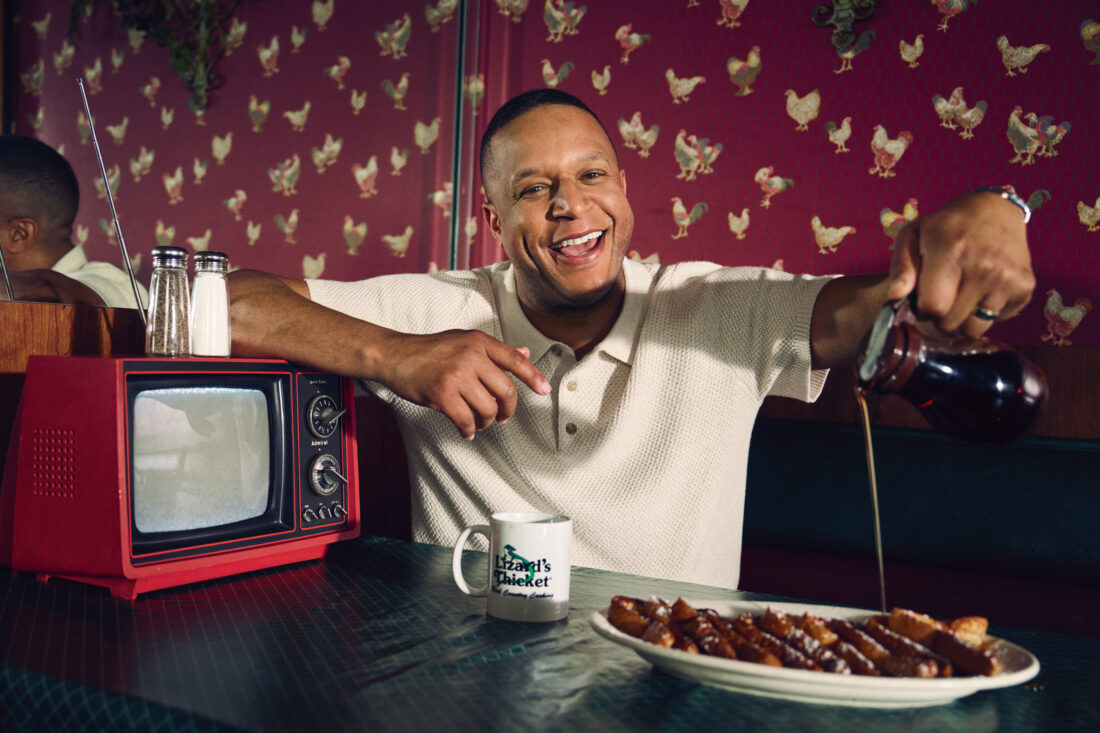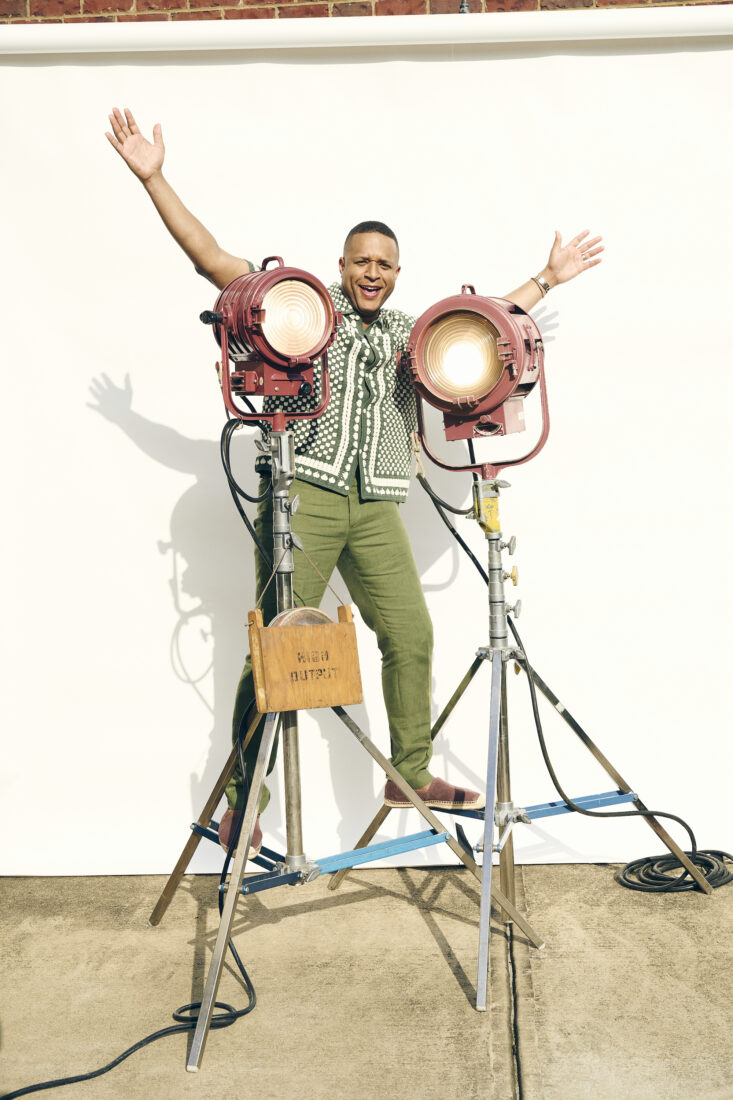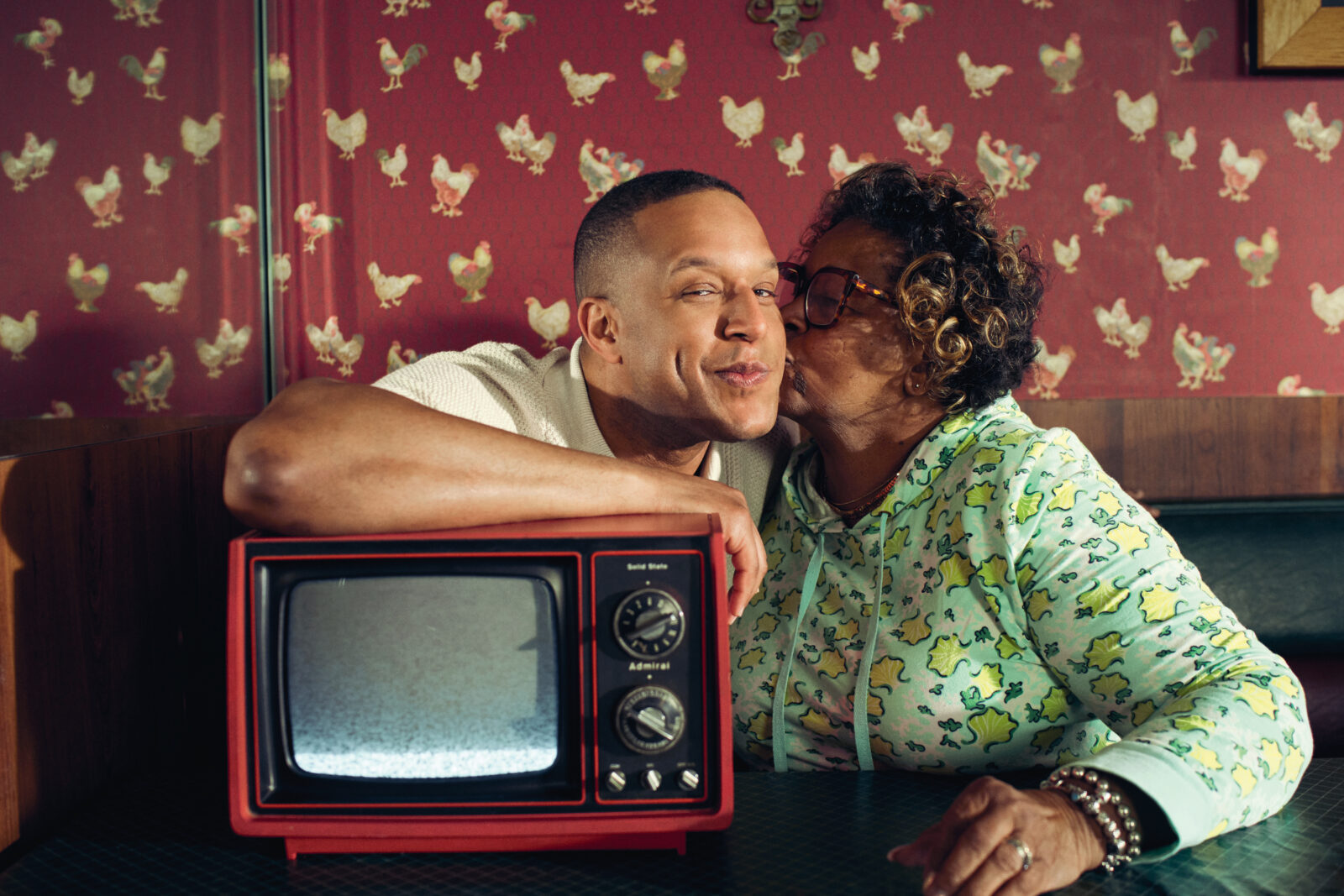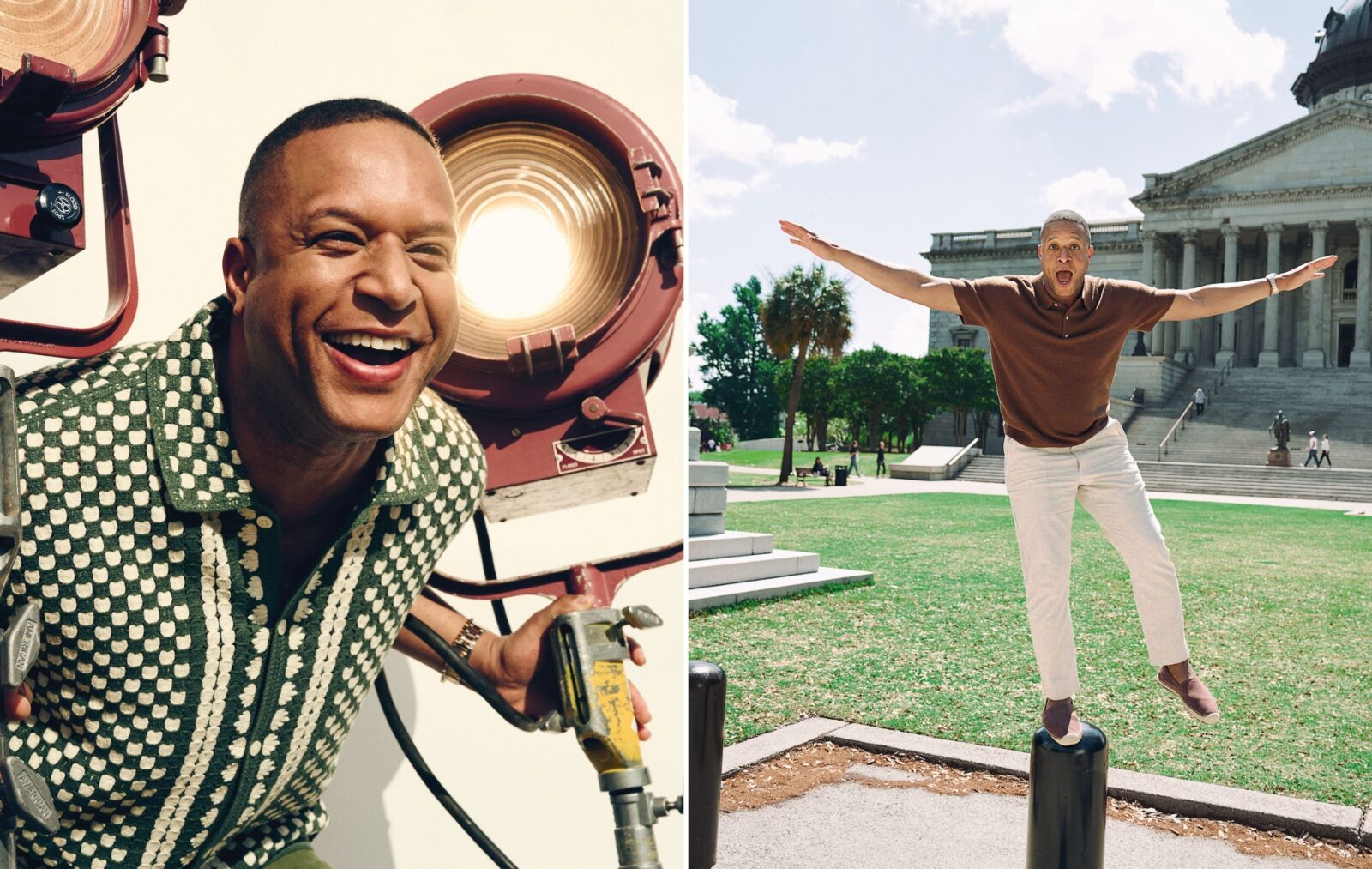Arts & Culture
The Eternal Optimism of Craig Melvin

Photo: SULLY SULLIVAN
“Twenty back, guys!” A voice shouts across Studio 1A. “Here we go in fifteen… Ten…”
Camera operators swing their monitors into place and pull fat bundles of cable across the floor. Production assistants jostle clothing racks and prop carts through the narrow hallways. It’s a little after 8:00 a.m. in Midtown Manhattan, and the set of Today, America’s longest-running morning show, feels like tightly orchestrated chaos: part pit crew, part pirate ship. Welcome to NBC. Welcome to 30 Rock.
“Nine…eight…seven…”
At the center of the frenzy, and seemingly unperturbed by it, is Craig Melvin, who succeeded the much-beloved Hoda Kotb as permanent coanchor of Today’s first and second hours this past January. Now it’s a Friday in March, and Melvin has been awake since 3:45 a.m. He’s tired (he stayed up late watching NCAA basketball games with his eleven-year-old son, Delano), but he doesn’t look it. He’s dressed in a smart blue windowpane blazer and dark slacks, with his skin mattified to the nth degree. A gold stud winks from his left ear; when his daughter, Sybil, asked to have her ears pierced for her fifth birthday, she requested he get his pierced first.

Melvin’s schedule has always been packed, but now he plans it to the minute. Throwing on a hoodie and jeans and taking the morning car ride to the studio? Twenty-two minutes. Reading the production team’s “overnight note” to prepare for his segments? Forty minutes. Gospel playlist and eye-mask massager? Twenty minutes.
The routine is sacrosanct. There is journaling in his dressing room and meditation. That’s followed by wardrobe (he shops for almost all of his own clothes), hair, and makeup. Because he can’t be home when Del and Sibby wake up, he sends them special messages through a device called Lovebox. The theme is always the same: I love you, and I’m proud of you.
“Six…five…quiet, please!”
Melvin smiles and checks his notes with the show’s main cohost, Savannah Guthrie. Then it’s go time: a five-minute interview with then twenty-nine-year-old baseball catcher J. C. Escarra, the son of Cuban immigrants who recently made the Yankees and went viral for an ecstatic call he made to his mother that was captured on video. Escarra looks a bit nervous under the hot glare of the studio lights; many people do on live TV.
“Dude, congratulations,” Melvin says warmly, leaning back in his chair. “You did it—you’re a Yankee!” His conversational signature is a near-constant tone of surprise, a silent whoa. “How does it feel?”
“A dream come true,” Escarra answers, shaking his head in disbelief. At his age, he considered this his last shot. Were it not for his family’s encouragement, he would have given up.
“You know what I loved about that call the most?” Melvin continues. “When you called your mom, it wasn’t, ‘Hey, I made it after all these years! I did it!’ It was we, we, we.”
The cameras cut to commercial, but Melvin keeps chatting. He’s turning the moment around like a prism, looking for hidden facets of connection. “You know, I can relate to this,” he tells Escarra. “I am a product of a village, and not just my mom and dad. I had a lot of people who invested a lot of time and money into my success.”
Melvin will do some version of this five or six times every hour until his portion of the show wraps, bouncing from desk to chairs to couch in a space not much larger than your average living room. By the time he heads back to his home in Westport, Connecticut, around 1:00 or 2:00 p.m. today, he will have delivered a sober rundown of global news, consulted a finance expert about automotive tariffs, darted out to Rockefeller Plaza for a shopping segment, snapped selfies with fans, discussed Paul Rudd’s newest movie, chatted with former Cosby Show actress Keshia Knight Pulliam, and sampled an assortment of healthy recipes. (If there are any cocktails left from the entertaining segments, he and his close friend Al Roker will, er, “sample” those, too.)
“He makes it look easy, but it’s really not,” says Carol Gable, a producer for NBC’s Dateline, which Melvin hosts on occasion. “I have seen how incredibly tirelessly Craig approaches projects, and he doesn’t just do his part and walk away. He stays with it.”
The pendulum swing between serious and soft is what Melvin loves. He understands the focus and gravity required to anchor evening news—he did that for years in his hometown of Columbia, South Carolina, and in Washington, D.C., before hosting his own show on MSNBC—but he believes that laughter, inspiration, and awe matter just as much. He knows what it’s like to need them.
Melvin’s goal is the same for every show: “I want people to think, but I want them to feel some days,” he explains. “Feel angry, feel sad, just feel…something.”
That approach, shared by the close-knit Today team, appears to be working. In the first quarter of this year, the show overtook ABC’s Good Morning America to reclaim its former position as the country’s leading morning program, with an average of nearly 2.7 million total viewers.

Photo: SULLY SULLIVAN
The forty-six-year-old broadcaster became a coanchor for the first and second hours of Today in January 2025.
But Melvin also knows what he’s up against. American audiences are more socially and politically polarized than ever; they are quicker to anger; and they are increasingly turning to podcasts and social media for their information. A recent poll from Gallup indicates that viewers’ faith in the mainstream media has dropped to its lowest point in five decades, with less than one-third of Americans saying they trust the media “a great deal.”
Yet, for whatever reason, millions of people seem to trust Craig Melvin. What’s he doing right?
The key to effective journalism, in Melvin’s mind, begins with talking to people. All kinds of people. He’s never had a problem with that. He talked so much as a child, in fact, that his elementary school teachers complained to his mother, Betty Jo. Family members often found him pacing his grandmother’s front porch in Cayce, South Carolina, riffing on sermons. “I truly thought he was going to do preaching,” Betty Jo recalls, “because after church on Sundays, he would come back home and do whatever the pastor did.”
Betty Jo put in long hours as an elementary school teacher, and Melvin’s father, Lawrence, worked the late shift at the post office. Craig and his younger brother, Ryan, were alone for much of the day. To help channel his abundant energy, Betty Jo nudged him into a smorgasbord of extracurricular activities, from team sports (soccer, Little League) to music (church choirs, school orchestra) to oddball pursuits like magic classes. In middle school, Melvin began entering oratorical contests put on by the local Elks Lodge and Optimist Club, which required him to deliver speeches on assigned topics in front of total strangers.

Photo: SULLY SULLIVAN
Melvin and his mother, Betty Jo.
“Those aren’t the kinds of hobbies that help you with the opposite sex,” Melvin says with a laugh, remembering his days wearing thick glasses and loud sweaters. The pop-culture character he most identified with? Not a superhero or star athlete, but Steve Urkel, the lovable, bumbling geek from the nineties sitcom Family Matters. Awkward as he felt at the time, Melvin learned to synthesize information quickly and to think on his feet. “I was able to run in a lot of different circles at a very young age,” he says, “and I didn’t fully appreciate how much that would benefit me until later in life.”
Having grown up watching the local news every night, Melvin auditioned for “Our Generation,” a young reporters’ segment on WIS-TV, Columbia’s NBC affiliate, when he was still in high school. “I had spent my entire life up until that point running my mouth,” he later wrote of his early on-screen experiences. “This was just more talking, on camera.” The assignment editor in charge of “Our Generation” hired him immediately. His peers reported on subjects like cafeteria food; he tackled education policy.
“He had the ability to look at issues, not just trends or styles,” says Randy Covington, the station’s news director at the time. Covington later submitted one of Melvin’s stories for a state Associated Press Broadcast Award. He was the only high school student to win.
Melvin’s classmates at Spartanburg, South Carolina’s Wofford College, where he majored in government, remember him as upbeat and optimistic, with a sharp and self-deprecating sense of humor. They still talk about the time he and a friend dressed up as the Spartan cheerleaders from Saturday Night Live for student orientation. “We knew then that he was going to be huge,” says Laurin Manning Gandy, who edited Melvin’s column in the Wofford student newspaper. “It was just so obvious that he had tremendous talent.”
Underneath that joyful exterior, however, Melvin was hiding a deep well of pain. His father often drank to the point of blacking out. There were DUIs and car accidents, and Betty Jo did her best to keep the kids away from it all. Later, Lawrence became addicted to video poker, too, and regularly burned through his paychecks. Melvin rarely saw him and came to think of Lawrence as “the ghost.”
The one point of connection between Melvin and his father during those years was Lawrence’s green 1973 Pontiac Le-Mans, which he tinkered with religiously. “Hey, can you come out and help me with the car?” Lawrence would ask, and Melvin would trudge outside, only to find that Lawrence wouldn’t really let him touch the car. “As I got older,” Melvin wrote in his 2021 memoir, Pops: Learning to Be a Son and a Father, “I realized it wasn’t about my actually being useful in any serious way…It was just about my being there. He wanted a buddy.”
In that way, Lawrence taught his son the most important skill for any aspiring journalist: how to sit in silence and just be. He taught him how to listen.
It’s a warm April afternoon in Columbia, and Melvin is eyeing the desserts at Lizard’s Thicket, a local country-cooking restaurant chain. His mother, Betty Jo, is finishing up a plate of liver pudding. With her large glasses and halo of soft curls, she carries herself with a refined presence you don’t see much anymore. Melvin catches sight of himself in a mirror and brushes a piece of lint from his collar. “Could be a gray hair,” Betty Jo deadpans.
Melvin narrows his eyes, taking mock offense at the joke, and pokes her in the ribs. She laughs.
“He loves family,” Betty Jo tells me, “because he doesn’t have to be somebody else.”
Melvin is as tied to his home state as a person can be without living in it. He regularly gives shout-outs to Columbia on the Today show. He sits on Wofford’s board of trustees. In his Connecticut home, which he shares with his wife, the sports journalist Lindsay Czarniak, he has hung reminders of home, including a painting by one of his favorite artists, Ernest Lee, known in Columbia as “the Chicken Man.” By the end of today, he will have purchased another one.
Whenever his dizzying schedule allows, Melvin flies to Columbia; he tries not to go more than three months without seeing his family. This week, he’s back to host a charity gala for Family Promise of the Midlands, a faith-based organization that helps those in need of transitional housing. Betty Jo is a volunteer board member. In 2023, when Melvin learned Betty Jo’s childhood home in nearby Cayce would be sold at auction, he bought it and leased it to Family Promise for one dollar a year.
Betty Jo still isn’t quite comfortable with the level of attention she gets now that her son is so well-known. Sometimes she doesn’t even tell people her last name. “Honey, I’m just Betty,” she says. “And Craig’s just Craig.”
Others don’t see them that way. (“When you take Craig to Columbia, it is like being with a visiting potentate,” says Carol Gable, the Dateline producer. “Everybody knows who he is.”) Within minutes at the restaurant, almost half a dozen people have come over to shake Melvin’s hand. Some remember him from his days as a twenty-two-year-old WIS reporter with a zany morning-show gig called “Craig Cam,” for which he roamed Columbia looking for unusual activities to try or quirky characters to interview. One day, he might visit the state fair or sing “Jingle Bells” with a pack of kindergartners; the next, he’d work the drive-through right here at Lizard’s Thicket.
“To be able to tell the kinds of stories I wanted to tell, I had to have a platform, and ‘Craig Cam’ gave me the platform,” Melvin remembers. “What was tricky was taking that sometimes goofy segment and trying to figure out how to have people take me more seriously.”
That opportunity came in 2003, when Melvin covered a prison standoff at the Lee Correctional Institution in Bishopville. Two guards had been taken hostage (one of whom had been stabbed), and the director of the Department of Corrections feared the violence would escalate if the inmates didn’t get to speak to the media—one of their key demands. After a briefing by a hostage negotiator, Melvin ventured inside with his tape recorder. The inmates shouted at him for the first twenty minutes (“inmates don’t riot unless they’re fed up and desperate,” he later noted), but he remained calm and listened, just as he had learned to do under the hood of his father’s LeMans. He emerged unharmed around forty-five minutes later. The guards were eventually released.
Melvin worked his way up to anchoring both of WIS’s evening news broadcasts, which won him three regional Emmys (two shared and one of his own). He also hosted a weekend show called Awareness, one of the state’s longest-running television programs focused on issues affecting African American communities. Ratings had fallen in recent years, so Melvin adjusted the show’s format to a dynamic panel discussion between civic leaders on topics he knew would spark meaningful debate.
Anton Gunn, who was then an activist and community organizer, served as one of the panelists before he was elected to the South Carolina House of Representatives. Gunn admired Melvin’s versatility: He could be tough and intellectual when the job required it, but his core openness showed through.
“Craig was willing to do the stories that nobody else would do in a way that nobody else could do it,” Gunn says. “You couldn’t put any other reporter out on the street in the middle of the night with local Crips and Bloods other than Craig Melvin.”
Proving himself paid off professionally, but it came at a personal cost. Sixteen-hour days left Melvin with little time for friends or a serious relationship. He experienced bouts of anxiety and depression, some of which he knew stemmed from parts of his childhood he’d never thoroughly unpacked. He decided to see a therapist.
“A lot of who we are, what we believe, how we behave,” he says, “a lot of that is shaped by things that we can’t fully appreciate until you start talking about it.”

Photo: SULLY SULLIVAN
Melvin beams in his hometown of Columbia, South Carolina; testing his balance in front of the South Carolina State House.
Melvin left WIS in 2008 to anchor the weekend evening news on WRC-TV in Washington, D.C. One of the things he took with him was a Post-it note from his early days as a WIS anchor. Back then, he wasn’t sure he was up to the task. Was he too young? Too green?
“Man, you will always be too something,” Steve Crocker, one of Melvin’s WIS colleagues, had told him. “You’ll be too young. You’ll be too old. You’ll be too Black. You will always be too something.” Melvin wrote that down and put it on his desk. He still has it.
Back in New York, the taping has wrapped for the day, and Melvin is now seated on a corner couch in his small, windowless dressing room. (Every space at NBC, it turns out, is smaller than you think it is.) He’s scrubbed the makeup off and changed into a dark sweater. It’s Friday, which means that he and Lindsay, whom he met in 2008 while both worked at WRC, will do a movie night with Del and Sibby. He can’t wait to be home.
Nothing has defined Melvin’s life as much as fatherhood. His strained relationship with his own dad sent him on a decades-long quest to both find positive male role models and become one. These days, inspiring stories about fathers are a central plank of his journalism. One of the stories that have most surprised Melvin is his own.
In 2018, after a family intervention, Lawrence Melvin entered treatment for his alcoholism and has been sober ever since, allowing him to be fully present in the lives of his wife, children, and grandchildren for the first time. Melvin now has full access to the best parts of the man he calls Pops: his patience, his humor, and his ability to listen without judgment. Every year, the family gathers in Hilton Head for a week, just to reconnect. “You can’t undo the things you missed out on,” Lawrence once told his son. “You just have to try to better yourself, to do better.”
Seeing the agony of his father’s addiction up close, Melvin says, made him a more patient and compassionate reporter. “We’re all broken in some way,” he says. “Some people are better at masking it than others, but we’re all just walking around broken.” Instead of drawing a curtain around his family’s struggles, Melvin has learned to embrace them, learn from them, and use them to help others feel less alone. Sharing is the antidote for shame.
Is this what viewers expect when they’re drinking their morning coffee? Probably not. But perfection is a race no one can win. Melvin sees his new role as a chance to do things differently.
Melvin props one foot over the opposite knee as he talks; the words “Super Dad” peek out in comic-book script from his ankle. Whimsical socks are one of his obsessions. So are plants and good bourbon and scented candles.
There used to be a framed photograph on the wall beside the door. It was an image of street graffiti shot by an NBC photographer during the height of the pandemic that read, “Everything is f **ked.” “I looked at the picture as a reminder that so many people feel that way,” Melvin says.
“But you don’t?”
“I do not,” he says. “Even during the darkest days of the pandemic, when I was being tear-gassed in D.C. during the George Floyd riots, I’ve never felt that way. In fact, I think the longer I do this, the more I feel the opposite.” The turbulence of the past few years hasn’t drained him of hope; it’s made him more committed to telling stories that build bridges, rather than burn them.
Which brings us back to the issue of trust. Why does he think people trust him?
He pauses. “I’ve always gone out of my way—deliberately—to make sure that all relevant voices get heard,” he says. “And I think there’s value in that. I think one of the reasons people don’t trust us as much as they did when we were growing up is because we kind of stopped doing that.”
Or maybe there’s something else at work. Maybe the audience can’t trust you if you don’t trust them—if you don’t share something of yourself, including your struggles and uncertainties. In a time of unprecedented division, maybe the most effective and responsible thing you can do as a journalist is remind your audience that we are all more than the tiny boxes we trap ourselves in. That it’s possible to both talk and listen; to be optimistic and realistic, funny and serious, strong and vulnerable.
“I’m a work in progress,” he says, “and I’ll never be the person that most people think that I am.” It turns out that was the secret all along.







